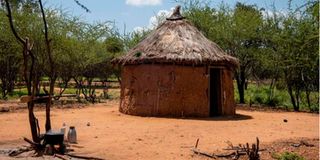Price of motherhood: The forgotten mums of Tiaty where a two-hour boda boda ride stands between life and death

Chepokunur Kamuke’s mud-hut that has served as a labour ward for mothers in her village in Tiaty Constituency for three decades, in this photo taken on September 8, 2024.
What you need to know:
- In Baringo County's Tiaty region, traditional birth attendant Chepokunur Kamuke's dimly lit mud hut serves as the only hope for expectant mothers across 20 villages.
- Despite 50 government-built health facilities standing empty in the area, desperate mothers must choose between Kamuke's limited expertise or risking a treacherous 70-kilometre motorcycle journey.
- The maternal health crisis in the region has led to alarming statistics - 375 women out of 100,000 die while giving birth, and 31 infants out of 1,000 don't survive delivery.
The epitome of womanhood is often said to be the joy of becoming a mother, and many women eagerly await this precious moment. But in Tiaty, Baringo County, this journey is fraught with challenges due to the lack of hospitals in far-flung areas. More often than not, the awaited bundle of joy becomes a source of misery as many women lose their pregnancies or babies due to inadequate healthcare.
Yet, in this challenging landscape, hope emerges with the dawn, as the rooster's crow pierces the pre-dawn silence and Chepokunur Kamuke stirs from her sleeping mat. At 63, her movements are deliberate but purposeful as she kindles the morning fire, its smoke curling through gaps in her manyatta's thatched roof. She knows that soon, just as she has for the past three decades, she will hear the familiar shuffle of feet outside her door – expectant mothers seeking her care in a land where modern medicine remains a distant dream.
"Every morning, I pray for strength," Kamuke says, her weathered hands methodically arranging her birthing tools: a razor blade, carefully wrapped in clean cloth; a bottle of sheep oil, worn smooth from countless uses; and strips of clean fabric for the new-borns. "Some days, the mothers arrive before the sun fully rises. Their journey cannot wait."
"These hands," Kamuke says, extending her weathered palms in the soft morning light that filters through her manyatta's single window. Deep creases map decades of service across her skin, each line seemingly etched by the countless births she has attended. "They may be tired now, but they know their purpose."

Chepokunur Kamuke inside her mud-hut in Koreleach, Tiaty Constituency, Baringo County on September 8, 2024.
Yet these hands, trusted by thousands of mothers over three decades, have never benefited from formal medical training. Kamuke's expertise comes from a more ancient source - generational knowledge passed down through watching and doing.
"The birthing skill was passed on to me by my mother," she explains, arranging her simple tools with practiced precision. "I used to accompany her and watch her work. That's when I got interested." Her voice carries both pride in this inheritance and a hint of recognition of its limitations in the face of serious complications.
Indeed, before the morning fire can warm her small mud-walled home, the first knock comes. A young woman, heavily pregnant and exhausted, has walked three hours through the darkness to reach her. This is everyday life for Tiaty's most respected traditional birth attendant.
The guardian's domain
"My biggest challenge is breech birth, when the baby comes out with the legs, then the head," she explains, her voice heavy with the weight of such critical moments. "Another challenge is when the mother needs blood transfusion. If we had a hospital, then nurses would have been in a capacity to handle the complications."
Her compound, perched on a gentle slope in Koreleach village, offers a commanding view of Baringo County's unforgiving terrain. Acacia trees dot the landscape like scattered sentinels, their thorny branches reaching toward a sky that alternates between merciless sun and torrential rains. During the dry season, dust devils dance across the parched earth; in the wet months, the clay soil becomes treacherously slick, making the already challenging journey to her home even more perilous.
Read: Island with no hospital
By mid-morning, her compound transforms into an impromptu pre-natal clinic. Today, 15 women sit in whatever shade they can find, their colourful wraps bright against the rust-coloured earth. Some have traversed steep ridges and dried riverbeds to reach here, others have navigated narrow paths winding through thorny scrubland. Each carries not only the weight of her unborn child but also the knowledge that this basic care is their only option.
Inside the manyatta, where strips of sunlight pierce through the thatch like nature's spotlight, Milka Chepkemoi reclines on a woven mat. Seven months pregnant with her fourth child, she has walked seven kilometres in the growing heat to reach Kamuke's care. Sweat beads on her forehead as Kamuke's oil-slicked hands move across her swollen belly with practiced precision.

Milka Chepkemoi who is pregnant with her fourth child, waits for her turn to be served by Chepokunur Kamuke , on September 8, 2024.
"The baby is strong," Kamuke murmurs, her fingers detecting subtle movements that tell stories only she can read. "But you, mama, need more strength." She reaches for a gourd of fermented milk, a traditional supplement she keeps for her most vulnerable patients. The sour liquid is rich in nutrients that many expectant mothers in this region desperately lack.
Chepkemoi accepts the drink gratefully, her free hand unconsciously touching the slight hollow of her cheeks – evidence of the malnutrition that nearly claimed her life during her last pregnancy.
"I delivered my three babies here because it is closer home," she says. But her previous pregnancy reveals the dangers of limited healthcare access. Insufficient nutrition had left her dangerously weak – a condition Kamuke quickly noticed, prompting her to insist on hospital care.
"I was anaemic and needed blood transfusion. I went to hospital and was admitted for two months," she recalls, her voice barely above a whisper. "The doctors said I needed blood, that my body was too weak. But how can I reach the hospital now, when even sitting on a motorcycle feels like torture?" Yet even after this near-death experience, with only two months before her current due date, she finds herself back at the manyatta. "The hospital is far away. I can't ride on a motorbike when I'm almost due. It's too risky."
As the sun climbs higher, casting shorter shadows across Kamuke's compound, more women arrive. They come from villages with names that speak of the land's character: Lokis, where rocky outcrops stretch toward the sky; Tirioko, where seasonal streams cut through the earth like veins; and distant Sigor, where the only properly equipped hospital stands, an impossible 70 kilometres away.
A young mother-to-be, barely 18, stumbles slightly on the uneven ground outside Kamuke's door. Immediately, other waiting women reach to steady her, their hands gentle, their words encouraging. This solidarity is born of shared experience – they all know the risks they face. In their circles, stories of mothers lost in childbirth are as common as tales of successful deliveries.
Most women come to have their babies' positions checked or seek relief through traditional massage techniques that Kamuke says help ease lower abdomen and back pains. But the challenges can be overwhelming. "When it rains, my house leaks," she says. "Sometimes, there are like five or eight mothers waiting to deliver. I can't handle all of them at once."

Kamuke attends to an expectant woman in her manyatta in Koreleach, Tiaty constituency, on September 8, 2024.
The burden on Kamuke is immense. Serving more than 20 villages in Korelach without charging for her services, she answers calls at all hours. "Sometimes, I'm called up past midnight by mothers in labour," she says.
Concillate Kapkony's story exemplifies the terrors that haunt Tiaty's expectant mothers. Each thought of pregnancy fills her with dread, her first experience etched in memory as a nightmare of pain and loss.
She arrives at Kamuke's as the day edges toward noon, her eyes carrying the shadow of recent loss. Her December 2023, ordeal serves as a stark reminder of what can go wrong when emergency care is out of reach. The memory spills out of her in quiet words that carry the weight of mountains.
"It began here, in Kamuke's house," she recounts, gesturing to the spot where she first realised something was wrong. "The pain was different – wrong somehow. When Kamuke said we needed to go to hospital, my heart nearly stopped. Finding a motorcycle rider willing to help took precious hours."
The journey that followed became a nightmare of increasing desperation. "The traditional birth attendant realised the baby was not in a good position," she recounts. What followed was a desperate journey – first to Ortum in West Pokot County, then a referral to Kapenguria County Referral Hospital. "By then, I had laboured for nearly 30 hours before giving birth. Unfortunately, the baby died due to complications arising from what doctors termed as prolonged labour."
Kamuke herself has witnessed the tragic consequences of these delays. Her voice drops to a whisper as she recalls one particularly haunting case: "She had laboured for too long and was very weak. I couldn't help her deliver. We took a boda boda, but unfortunately, we lost her and the baby on the way to hospital."
Her plea is simple but urgent: "We've lost so many mothers and children due to lack of dispensaries. I want the county government to equip the facility with a nurse and also drugs. We also need an ambulance to transport critically ill patients."

Phanice Ronit, dedicated community health promoter for the past five years, arrives at Kamuke's compound carrying her precious record books. Each page tells stories of triumph and tragedy – births successfully managed, lives saved through timely referrals, and heart-breaking losses that might have been prevented with better healthcare access.
"Look here," she says, pointing to a recent entry. "Two months ago, we lost both mother and child. She was young, strong, but when complications developed..." Her voice trails off as she shows Kamuke the empty space where cause of death should be recorded. In these remote villages, even death often goes unexplained.
Perhaps the most cruel irony in this healthcare desert stands just a kilometre from Kamuke's manyatta – a newly built dispensary, its windows dark, its doors locked. It's one of more than 50 such facilities constructed across Baringo County between 2013 and 2022, monuments to unfulfilled promises and administrative challenges.
Financial burden
In Lokis Location alone, three such facilities dot the landscape. Two stand completely empty; the third operates without a nurse, its medical supplies minimal, its impact limited. These buildings, their paint still relatively fresh, mock the daily struggle of women forced to rely on traditional birth attendants, no matter how dedicated those attendants might be.
"The journey takes two and half hours," explains Ronit. "The road is sloppy and bumpy, a mother in labour has to persevere all that."
The financial burden adds another layer of difficulty. "From Koreleach to Sigor is Sh2,500 per trip," says Kapkony. "Sometimes a boda boda rider will say it's too late to travel or ask for more money. Since one is desperate, you might end up paying Sh5,000."
The tragedy extends beyond maternal health. Children miss crucial immunizations, leaving them vulnerable to infectious diseases. Meanwhile, more than 50 health facilities built by the county government of Baringo in remote areas between 2013 and 2022 stand empty, waiting for staff and supplies.
Josphat Lokorio, Chairperson of the Health Committee in Baringo County, explains the challenge: "The health department is poorly financed. The county government relies on donor funding for most of our projects in far flung areas. In the 2024/2025 financial year, the budget has been up-scaled to Sh1.2 billion. We hope to equip some of the facilities with staff and drugs."
The statistics cast long shadows over every pregnancy in this region. In Baringo County, 375 out of 100,000 women die during childbirth – a number that translates to more than 5,000 deaths annually from pregnancy-related complications. For every 1,000 babies born, 31 never take their first breath. Behind each number lies a story of a family forever changed, a community diminished, a future erased.
"We understand the urgency," he says. "But establishing and maintaining healthcare facilities in remote areas requires more than just buildings. We need sustainable funding for staff, supplies, maintenance. Currently, we depend heavily on donor support for our rural health initiatives."
A 2022 Unicef report on maternal and child health emphasises what Tiaty's women already know too well – skilled medical personnel are essential for reducing mortality rates. The report details how trained professionals can identify warning signs early and facilitate rapid emergency care when complications arise, resources that even the most experienced traditional birth attendants cannot provide.
As night falls, the sun sets behind the acacia trees, painting the sky in fierce oranges and deep purples. Most of Kamuke's patients have returned to their villages, navigating the same challenging terrain that brought them here, their questions answered, their babies' positions checked, their anxieties temporarily soothed.
But Kamuke's day isn't over. It never really is. She arranges her birthing tools once more, knowing that babies don't follow schedules. Tonight, like every night, she'll sleep lightly, ready for the urgent knock that could come at any hour.
Through her manyatta's small window, she watches the empty dispensary building, its silhouette a reminder of what could be. "We don't ask for luxury," she says, her voice carrying decades of determination and hope. "We ask for the basics – nurses, medicines, and an ambulance. Every mother deserves the chance to safely bring life into this world."
As darkness settles over Tiaty, the stars emerge one by one, watching over a landscape where the journey to motherhood remains perilously close to a journey to mortality. The future of this region – its mothers, its children, its very fabric – hangs in the balance, waiting for the day when modern healthcare finally reaches its most remote corners.
Until then, women like Kamuke stand as guardians at the threshold between life and death, their bare hands continuing to welcome new generations into the world, even as they pray for the change that must surely come. Tomorrow, as always, she will rise before dawn, kindle her fire, and prepare to serve as the only hope for mothers in a land where hope often feels as scarce as rainfall.





